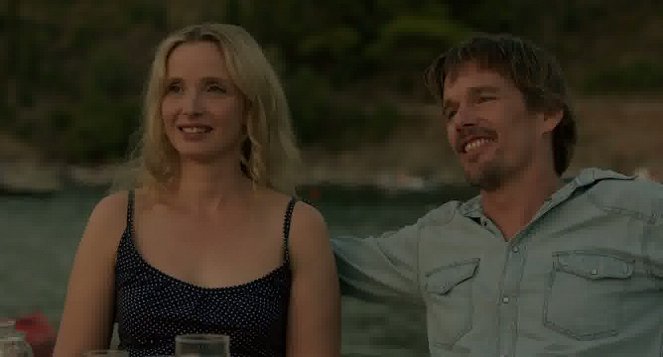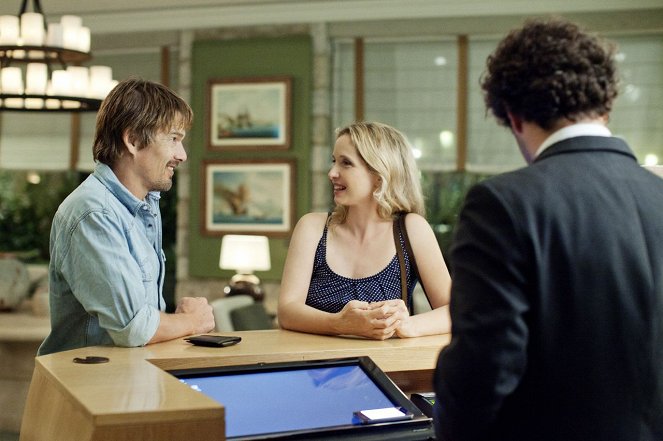Réalisation:
Richard LinklaterPhotographie:
Christos VoudourisMusique:
Graham ReynoldsActeurs·trices:
Julie Delpy, Ethan Hawke, Athina Rachel Tsangari, Panos Koronis, Ariane Labed, Walter Lassally, John Sloss, Seamus Davey-Fitzpatrick (plus)Résumés(1)
Une île grecque, une villa magnifique, en plein mois d'août. Céline, son mari Jesse et leurs deux filles passent leurs vacances chez des amis. On se promène, on partage des repas arrosés, on refait le monde. La veille du retour à Paris, surprise : les amis offrent au couple une nuit dans un hôtel de charme, sans les enfants. Les conditions sont idylliques mais les vieilles rancœurs remontent à la surface et la soirée en amoureux tourne vite au règlement de comptes d'un couple en pleine crise de la quarantaine. Céline et Jesse seront-ils encore ensemble le matin de leur départ ? (Diaphana Distribution)
(plus)Vidéo (5)
Critiques (10)
Viaggio in Grecia. I got the same impression of superfluousness from The Godfather Part III, which at first glance was also made mainly for the purpose of reuniting old friends (real friends, not fictional). Everything essential was said before dusk and the rest belonged to reflections blurred by the spell of what was left unsaid. The third instalment abandons the concept of the previous two. The central couple is not under time pressure. They are not worried about the future, but they are haunted by the past to a greater extent than before. The dialogue is not between just the two of them, as other characters come into the picture, among whom all generations and at least three different worldviews are improbably represented. The attempt at a more complex definition of love in the 21st century (particularly the repeated allusions to modern communication technologies seem forced) disperses the attention that had previously been focused exclusively on the portrait of a single relationship over the course of time. The partners realise that the romantic situation (the hotel) was artificially created for them and they sarcastically comment on it, but they are still victims of film clichés (a previous partner is “destroyed” by alcoholism, the sexual act is interrupted by the ringing of a mobile telephone and if anyone is exposed not only in the figurative sense, it is only the woman). ___ Eric Rohmer had earlier fondly used dialogue as a crucial structural element, but he employed the mood of the surrounding environment to flesh out the characters. In Linklater’s previous two films, the space in which the dialogue took place could not be described as an extension of the characters’ inner world. Before Midnight offers a slight upgrade. It’s as if the summer-holiday mood of the chosen setting predetermined the less hurried tone of the film, and Greece, the land where tragedy was born – together with references to Medea and Rossellini’s Journey to Italy, culminating in the famous scene with the ancient statues – indicated a shift to more serious problems. Thanks to the partners’ sense of detachment and ability to engage in self-reflection, however, the film brings to mind the pleasant ease of previous encounters, despite the greater cynicism and cruelty in the emotional exposure, and the ancient tragedy fortunately does not happen (although fateful mistakes are made and the insurmountable differences between the genders bear some of its features). ___ It is apparent from the more bitter tone that both the director and the actors wanted to put the protagonists in a certain position and face them with certain problems that would push the tone of the “Before” sequence to the brink of total relationship de(con)struction along the lines of Who’s Afraid of Virginia Woolf? With respect to that, the element of chance that was a characteristic of the previous pair of films, which serious themes crept into quite casually, was weakened. The more ordinary framing detracted from the uniqueness of Celine and Jesse’s story. Though it’s true that the dialogue, again appropriately interspersed with meaningful silences, is still extraordinarily authentic and abounds with learned truths about life, the overall narrative structure is more carefully thought out and thus devoid of any hint of spontaneity. ___ Even though I didn’t find the film entirely believable, I would take the point of most of what it had to say. To hear the dialogue in an American film transition with such ease between comical, sentimental and cynical is a minor miracle (the naturalness of these “transitions” clearly shows that Delpy is a better actor than Hawke, who is more or less always thrown into the same casual position). Before Midnight is an invaluable treasure trove of useful advice for less experienced couples and bitter truths for those who have been around the relationship block before. As in the case of Before Sunrise and Before Sunset, anyone’s assessment of Before Midnight will be strongly influenced by their personal relationship experiences. I admit that if I give Before Midnight the lowest rating of all three films, that may be because I have not yet grown up enough to fully appreciate such a mature view of interpersonal relationships. Appendix: After some time had passed, I watched the film a second time and I have to admit that the “paradigm shift” from walking to walking away is radical enough to justify the slight change in style and the increase in the number of speaking characters. I particularly appreciate the naturalness with which we are prepared for the uncompromising solemnity at the end. It’s not merely the theme of conversations into which the fleetingness of time repeatedly creeps, but also, for example, the names of the characters (Ariadne, Achilles) referring to worlds that are ancient, vanished and yet still alive (not only in Greece). This dichotomy corresponds to the way Linklater and his two actors understand the coexistence of two beings. Despite their utterly sober view of relationship setbacks, with all their ephemerality, they do not completely renounce their romantic belief in eternal love. At least in this respect, Before Midnight is several decades ahead of most American romantic stories, which only falsely comfort us without a hint of scepticism. 80%
()
(moins)
(plus)
Julie Delpy and Ethan Hawke’s romance hit my life out of the blue. I actually entered the story at a moment when they met for the second time, supposedly by coincidence and again in Paris. Yes, I didn’t have the honor of watching their first meeting after I saw this one. On the other hand, I believe that I got quite far when it comes to intimate discussions and I managed to catch a lot from the things that happen in the movie. Unfortunately, I simply can’t give it more than four stars. I think that maybe a woman would appreciate this part more than a man. Whatever is a victory for the lady in this movie is a challenge for the man. And I’m talking about relationships. And in this one, Julie does it several times. The opening part of the movie seems like pure bliss, especially that endless scene in the car. Then you get another great scene at the Greek lunch and in the end it’s all ruined by the night at the hotel. I don’t know why and I don’t want to be a male feminist, but it’s always the guy who’s at fault. Why is that? Anyways, Greece doesn’t get any sexier than it is in this movie. I’m really glad that even a couple of Americans, or rather the authors of this movie understood that Europe can be pretty amazing.
()
Anyone who has ever loved knows these fears. The fear of loneliness and at the same time fear of the weight of past decisions, of the power of chance and the relativity of time. Because romantic encounters are beautiful and spontaneous and magnificent, heart-rending reunions are unforgettable. But love years later is something that cannot be left to chance. Richard Linklater has resurfaced with a film that had countless opportunities to fail, to fail to live up to its predecessors, and to dilute the magic of what seemed definitive. And just like in Paris, I was blinded with tears by being able to pick up nine years later, in the same place. Some things in life may wither sooner or later and some things unfortunately intensify. And despite the fact that Before Midnight tears the heart in the most intimate and treacherous way, these two talkative travelers are once again at full strength. Their eighteen-year odyssey has no equal in the genre of romantic drama. And my sixth sense tells me that the year 2022 might bring us something good again.
()
In the final part of the trilogy, Linklater and I really clicked. His characters have finally grown up and, despite their flaws, they are now able to behave as mature parents and partners. It is no longer so self-centered because their children, acquaintances, and friends complement the married couple. In terms of age, worries, and emotions, I feel close to them and I understand their problems and behavior. I would say that Linklater has matured as a filmmaker during the long breaks between films. Overall impression: 80%.
()
At the beginning, I will try to uselessly separate the individual parts from each other. Before Sunrise was a beautifully naive romantic comedy about two young people full of ideals who accidentally burned (went crazy). Before Sunset is the story of two mature adults who went somewhere, but memories draw them to something they maybe should have done (but didn't). Before Midnight is the story two people who changed their lives for a memory and did what they promised never to do at the beginning. As a result, the third film is necessarily the most open, most intimate (there are few secrets and room to pretend to “be someone else"), the most painful (many of the themes that were the subject of jokes in previous cessations return, but now it is a lot worse to laugh at them), and also the most markedly sarcastic to cynical. It's a conversational analysis of everyday routine that reveals the remnants of the "intellectual sex appeal" that Jesse and Celine felt, but above all it is a civilian dive into banality, fatigue and fear of being alone. Before Midnight is full of irony, both internal and contextual (the casting of the non-conformist observer of the disintegration of the traditional Athina family, Rachel Tsangari, in the role of a cheeky Greek woman), contains probably the best dialogue in the trilogy (car scene), and it is largely lacking the paper rustle of its predecessor. Smoothness bordering on routine (but the most interesting), the kitschy environment of the Greek idyll constantly clashed with minor conflicts, fears and suspicions that at the end of Before Midnight there will be no place for a dream and romantic dreaminess. Nevertheless, the final scene is fragile and playful, full of contrasts of hope, resignation and humor, which develops the relationship of one of the most remarkable film pairs, both poetically and relentlessly sober. Linklater's minimalist direction once again triumphs and relies on organically flowing time, sometimes divided by the caesuras of sadness / enchantment. The script is even more polished, pointed and full of sharp wit - although in a few scenes there is again hesitation as to whether the little pearl at the bottom is worth the big a pile of words. I don't want to share it with anyone, but if I have to, then Before Midnight is closest to me emotionally and mentally. So, Jesse and Celine, later... in the next decade.
()


